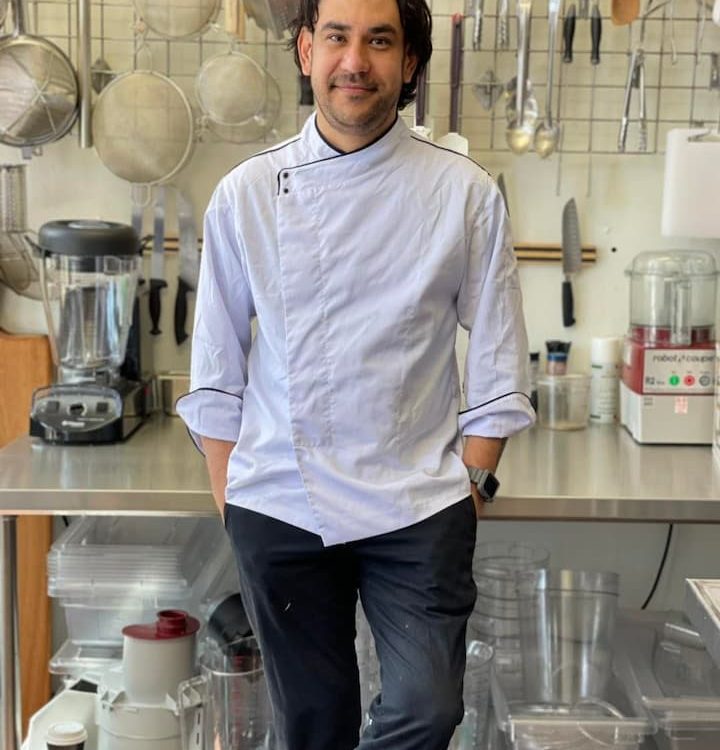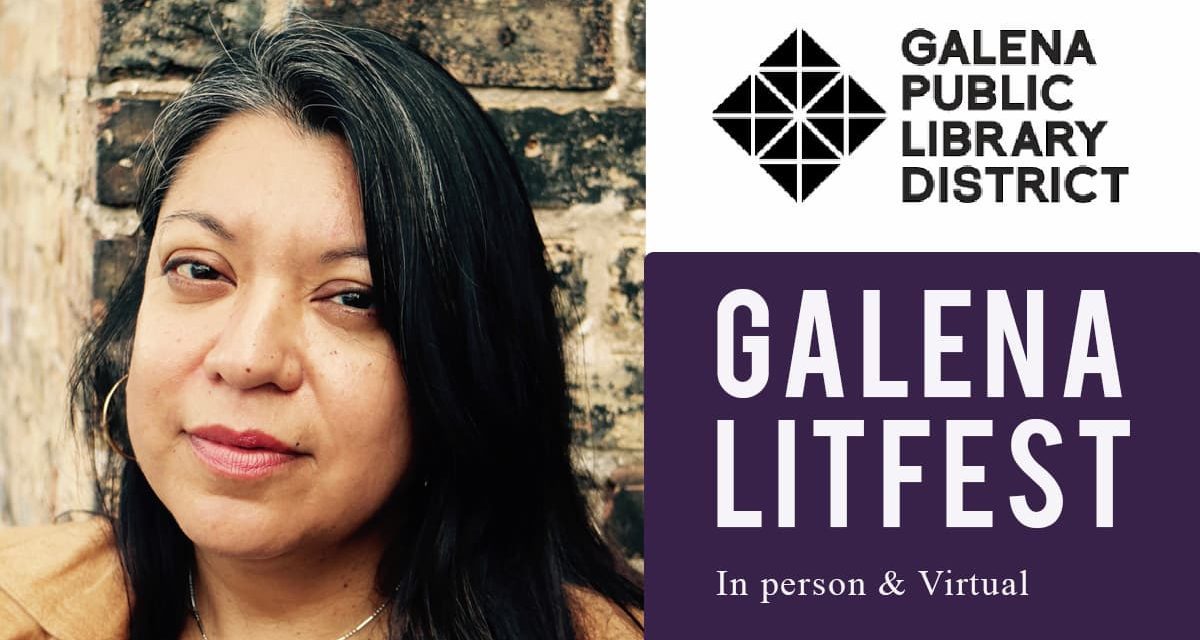GALENA — A part of poet Angela Trudell Vasquez values editing so much that she takes detailed, numbered notes on every round of change she makes to her own work. Often, she’ll edit her poems 30 to 50 times.
But there is another part of Vasquez that recently put aside a carefully-prepared craft talk at a poetry event following the reversal of Roe V. Wade and spoke for an hour off the cuff.
Her balanced approach – giving the impromptu, spontaneous creation as much value as deeply edited work – is part of what attendees will receive during Vasquez’s free presentation as part of Galena LitFest, a celebration of diverse authors. It’s a balance she learned by growing up in an expressive family that debated regularly, she says.
“I grew up in a garrulous family. We had politics for breakfast,” says Vasquez, who is also the poet laureate for Madison, Wis. “We’d spend hours at the kitchen table, just talking. And reading deeply.”
Vasquez has many ties to the Midwestern region and especially Iowa. She grew up in Iowa City and Des Moines and graduated from Drake University in Des Moines, where she lived until 1997. Tonight, she’ll talk about the “craft” of poetry and also provide a live reading of her poems.
Childhood in Iowa helped shape Vasquez as a poet
Vasquez is among several featured authors this year who help to break a common stereotype of poets, says Larissa Distler, adult services coordinator at the Galena Public Library District. “We actually have a very modern poetry resurgence happening.”
Vasquez will speak at 6 p.m. tonight at Miss Kitty’s Grape Escape, 242 N. Main St., and the event will be available online. Pre-registration is required for both in-person and virtual attendance. A recording of the presentation will also be available three to five days afterwards to those who pre-register.
Vasquez spent her youngest years in Iowa City, where her father attended the University of Iowa, and her family lived in student housing. One of her most impactful memories is participating as a very young girl in a picket line alongside workers at a lettuce farm, an experience she captured in her poem “Discount Lot.”
After her family moved to Des Moines, Vasquez remembers starting to write at around age seven. Her family then moved to Pleasant Hill, a Des Moines suburb. “I still have all my journals from all of that time. I escaped into my books.” She also recalls experiencing sporadic moments of racism, moments she now describes as “part of growing up in the great melting pot. I had to be a young person understanding that racism exists,” she says. “I had to go through that as a young person and come out on the other side. But I lived a really charmed life, so there was always a family to go back to.”
That charmed life included often being better off financially than many of the white students with whom she attended school. Both of her parents had well-paying jobs, and her house was where her “generous,” outgoing parents hosted large family events often. Growing up as a “wealthy brown family going to poor white schools” has stuck with Vasquez, she says, and deeply influenced her as a poet.
Vasquez’ impact includes the internet, public libraries, public schools
Vasquez’ most recent anthology, “My People Redux,” came out in early 2022. She has earned deep respect and adoration in her work as Madison’s poet laureate, a position to which she was first appointed in early 2020, then reappointed in 2022. She’s Madison’s first-ever Latino poet laureate.
Her presentation Thursday night will be both a “craft talk” – a look at how to make every word, punctuation mark and space count in poetry – and a live reading of her work.
She sees the position of poet laureate as a matter of “public service,” bringing poetry alive for all kinds of people and meeting them where they are. “You belong to the people. And so regardless of party affiliation or how you feel about a particular subject, our role is to go to out there and connect with people to find those connections. We have to be open.”
One of the biggest impacts she’s had in the role is to take poetry reading online. Vasquez started her role just as the COVID pandemic began in 2020 and immediately recognized a need to provide “beauty and poetry.” She also believes “communities are healthier when they have a robust poetry scene” — and further, believes poetry is mean to be “put out in the world.”
“Poetry is rooted in an oral tradiition,” she says. “There’s nothing better than going to a poetry reading and being moved.”
Vasquez also works closely with several schools in Madison, including one whose students created large-scale artwork to illustrate her poem. A big part of her focus in working with those “young to the page” is to help them first “explore what they think or feel.
“I don’t really know what I feel or think until i write it down,” she says. “So I talk to them about the importance of knowing who you are, so you can go out and love other people.”
Her work as poet laureate takes her into many collaborations with public schools and libraries. One such collaboration, with students at Madison’s Lindbergh Elementary, led to an animated video created by third-, fourth- and fifth-graders to illustrate three of her poems. The project is showcased by the Midwest Video Poetry Fest.
She helped create and shape the Bus Line Poetry Contest, which encouraged public transit riders to submit poems to be featured on buses and on the public transit system’s website. Most recently, she’s been working with students at Madison East High School, helping teens write their own poems to be published in the school’s East Expressions Literary + Arts magazine.
“Angie was compassionate and empathetic with our East students,” says Jennifer Milne-Carroll, the school librarian and editor of the magazine. “Students were especially able to relate to Angie through her captivating stories of growing up Mexican-American in the Midwest.”
Vasquez equally values formal poetry training and spontaneous free-writing
Vasquez first achieved recognition as a poet in 2003, when she was a featured poet at Seattle’s Bumbershoot festival. From 2009 to 2011, she was the featured poet for Milwaukee’s Latina Monologues. She earned a Voices Award from Planned Parenthood in 2013 for her poetry, and has published three anthologies, including “In Light, Always Light ” in 2019 and her latest from 2022 “My People Redux.” Her poems have been published in more than 40 journals.
Nevertheless, she decided to pursue further training and education in poetry at age 48. She was chosen to enter the Institute of American Indian Arts Master of Fine Arts program, an elite writing program in New Mexico devoted to arts education and to supporting excellence in Native and non-Native artists.
Vasquez says going back to school for more training in poetry was one of the best decisions she ever made. Her mentors helped her learn how to take her poetry to an even higher level. “They taught me how to keep pushing and take a poem to the edge of itself, and to question everything: what to include, what not to include,” she said. “They taught me how a poem doesn’t have to say everything, and I would have a tendency to do that.”
Already meticulous in her self-editing process, Vasquez became even more so after she earned her Master of Fine Arts. She says her mentors’ guidance are still voices echoing in her head, constantly pushing her to work hard on every line.
“Every word has to do two or three different things. Not just one,” she says. “It’s really easy to put words on a page. It’s another thing to make those words into something beautiful and succinct.”
She passes that joy of editing on to her students, constantly asking them how many times they edited their pieces and encouraging them to edit again.
Yet, Vasquez also incorporates free-writing in her outreach. She’ll guide her students to engage in “automatic writing” for about five or 10 minutes, and then share their work. She describes the time as a chance to “flex our poet muscle.” “Sometimes, I think when you’re really in it, if you practice automatic writing, beautiful things will happen on the page.”
She’s experienced that herself, her Roe V. Wade presentation standing out the most in her recollection. During interviews, powerful phrases flow out with ease. For example, Vasquez describes her mastery of words as part of her “conscious decision to master the English language, knowing it was the language of the conquerors.”
Though not conversationally fluent herself in Spanish, Vasquez aims to have bilingual workshops whenever possible. She also initiated a drive for Madison to have its first-ever Youth Poet Laureate.
“Angie Trudell Vasquez is a stellar poet laureate,” says Rita Mae Reese, a fellow award-winning poet from Madison. “She is an inspiring presence in Madison and well beyond. I really can’t say enough good things about her. We are so lucky to have her in Madison.”
Vasquez appearance, Saturday’s “Savoring” wrap up Galena LitFest
Galena LitFest first started in 2015. This year, the fest has already featured several other standout authors. They include nonbinary best-selling author Casey McQuiston, who spoke Jan. 17; and Stormy Stipe, an award-winning author who examined James Baldwin’s work as part of her presentation on personal essays Jan. 21.

Chef Fernando Escalante will prepare a four-course meal to accompany author Beth Dooley’s presentation Saturday evening.
The festival wraps up this Saturday with a first: a melding of literature with local produce through “Savoring: Winter Feat.” The event will showcase local food producers, including those growing micro-greens.
“We do have a lot of local producers and a lot of variety in what they are able to come up with. I’m really excited to showcase all of that,” Distler says.
The event features author Beth Dooley, who writes about food for the Minneapolis Star-Tribune and has published a dozen books. Dooley is also James Beard Award winner and provides “Bare Bones Cooking” classes nationwide. Chef Fernando Escalante of the Galena Cellars Vineyard and Winery will prepare a four-course meal as part of the event. Tickets are available here.
Reserve your spot for Vasquez’ presentation tonight here.
(photos courtesy Galena Public Library District)



